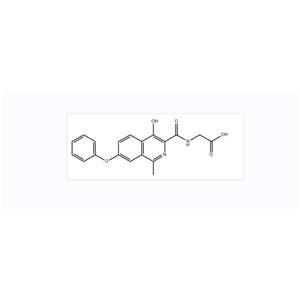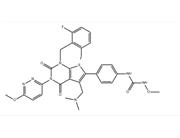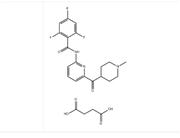Rosalista property Melting point 199-215 ° C Boiling point 684.3 ± 55.0 ° C (Predicted) Density 1.389 Storage condition -20 ° C Solubility SolveinDMSO (uptoatleast25mg/ml) Acid dissociation constant (pKa) 2.46 ± 0.10 (Predicted Factor (HIF) -Prolyl hydroxylase (PH) enzyme inhibitor can stabilize HIF, inhibit its degradation, activate the transcription of related genes, generate corresponding physiological reactions, moderately increase the concentration of erythropoietin, improve the sensitivity of erythropoietin (EPO) receptor, coordinate the production of red blood cells, reduce the level of HAMP, increase the content and activity of Transferrin receptor, promote the absorption and utilization of iron, and has good tolerance. Pharmacological action Rosalrestat belongs to 4-hydroxy Isoquinoline derivatives, small molecule HIF-PH enzyme inhibitor. HIF is an important transcription factor that adapts to oxygen changes in the body, and under normal aerobic conditions, HIF-PH enzyme can promote HIF degradation; When the body experiences hypoxia, the activity of HIF-PH enzyme is inhibited, and the accumulation of HIF increases, thereby inducing corresponding gene expression and enabling the body to adapt to changes in hypoxia. Rosalistat inhibits the activity of HIF-PH enzyme, increases the Cumulant of HIF, and then produces corresponding physiological response without hypoxia. The interaction of rosacetam has good tolerance and few adverse reactions. In clinical studies, its adverse reactions are mostly mild, including headache, back pain, fatigue, and diarrhea. The incidence and severity of adverse reactions are not significantly different from those of the placebo or positive drug control group, and are mostly related to the patient's own disease status. Compared to EPO induced hypertension and vascular embolism problems, the incidence and severity of adverse reactions are not significantly different from those of the placebo or positive drug control group, The adverse reactions of rosacetam in cardiovascular aspects are more easily accepted. The side effects of rosacetam mainly include cardiovascular and cerebrovascular diseases, such as hypertension, thrombosis, heart failure, etc; Gastrointestinal tract, nausea, vomiting, diarrhea, constipation, etc; Electrolytes, Hyperkalemia, etc. Bioactive Roxadustat (FG-4592) is a type of HIF in cell-free assays- α Prolyl hydroxylase inhibitors can stabilize HIF-2 and induce EPO production. Roxadustat can enhance the ferroptosis induced by RSL3. Phase3.

 China
China



